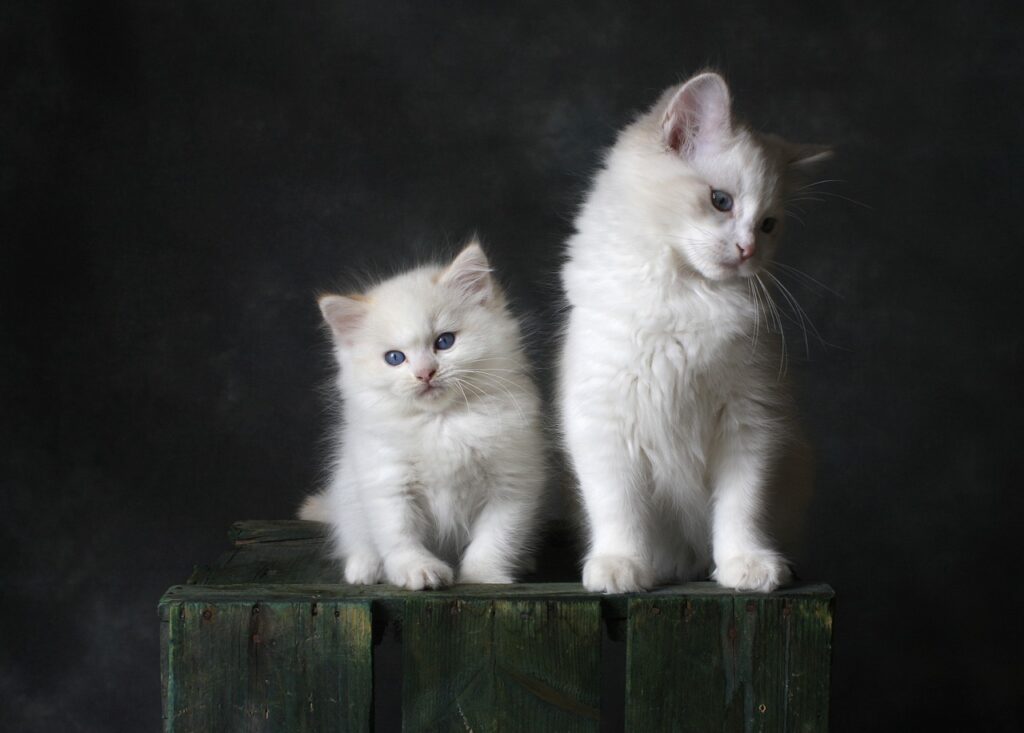Can Cats Eat Basil? – Yes, They can
Cats can safely enjoy basil in small amounts. This flavorful herb isn’t toxic to felines and can add a fragrant twist to their usual diet. Although not a necessary addition to their carnivorous dietary needs, a little nip of basil here and there can be a safe way to introduce variety. Just remember to introduce it slowly and watch out for any unusual reactions, as with introducing any new food to your pet.
Can Kittens Eat Basil?
Yes, kittens can nibble on basil, but it’s important to exercise more caution. Kittens have delicate digestive systems, and introducing new foods can be riskier. If you decide to offer basil to your kitten, do so in very tiny amounts and not as a regular part of their diet.
Things to consider when feeding basil to kittens?
Kittens are still growing, and their nutritional needs are quite specific. Basil should not be used as a supplement or replacement for their core diet. Always ensure that kittens have a balanced diet formulated for their growth needs, and use basil only as a tiny occasional treat, ensuring it doesn’t cause digestive upset.
Nutritional Benefits of Basil for Cats – Why Basil is Good for Cats
Antioxidant Properties
Basil is rich in antioxidants, which can help protect the body’s cells from damage by free radicals. For your feline friend, this means a boost in overall health and well-being when consumed in moderation.
Natural Anti-Inflammatory
This herb has natural anti-inflammatory properties that might benefit cats who suffer from inflammation-related health issues. Adding a small amount of basil could support their health by reducing inflammation.
Digestive Aid
Occasionally, basil can serve as a digestive aid for cats. The herb’s antimicrobial properties could potentially help in fighting off some bacteria in the gut.
Vitamin K Source
Basil contains Vitamin K, which is an essential fat-soluble vitamin that plays a role in blood clotting. While cats will get most of their required Vitamin K from their primary diet, the small amounts in basil can contribute to their overall intake.
Fresh Breath
Feeding your cat basil might also help freshen their breath thanks to its strong aroma and natural antibacterial properties.
Potential Allergies: Can Cats Be Allergic to Basil?
Though it’s rare, cats can be allergic to anything, basil included. If your cat is trying basil for the first time, keep an eye out for any allergic reactions.
Symptoms of Basil Allergies in Cats
- Gastrointestinal Upset: Look for signs of nausea, vomiting, or diarrhea which might suggest a sensitivity or allergy.
- Skin Irritation: Observe any excessive itching, redness, or bumps on the skin that were not present before.
- Respiratory Problems: Notice if there is any coughing, wheezing, or difficulty breathing after consuming basil.
What to Do If Your Cat Shows Symptoms?
- Remove Basil: Immediately stop feeding basil to your cat if you notice any symptoms.
- Veterinary Consultation: Consult with a veterinarian to get a proper diagnosis and treatment if symptoms persist.
- Monitor Closely: Keep an eye on your cat’s condition and any other potential allergens they might be exposed to.
Recommended Amount: How Much Basil Can a Cat Consume?
Stick to a sprinkle of basil leaves occasionally. Due to their carnivorous nature, cats do not require herbs in their diet, so basil should be considered as a treat rather than a dietary staple.
Things to Consider When Feeding Basil to Cats
Consider the freshness of the basil and whether it has been exposed to pesticides. Always wash it thoroughly and chop it finely to prevent any choking hazard. Remember to start with a tiny amount to see how your cat reacts.
How to Feed Basil to Cats: A Quick Guide
Introducing basil to your cat’s diet can be a nice change, providing them with a unique flavor while also giving them some slight health benefits. Below are ways to safely incorporate basil in small quantities into your cat’s treats.
Basil-Infused Water
Steep a basil leaf in water to create a subtly flavored drink that intrigues your cat’s palate. Ensure the water is room temperature before offering it to your cat.
Basil Topped Treat
Sprinkle finely chopped basil on top of your cat’s regular food for an aromatic twist. Monitor how your cat responds before making it a regular addition.
Frozen Basil Cubes
Blend basil leaves with water and freeze in an ice cube tray for a refreshing treat. Offer these sparingly, especially during the warmer months.
Conclusion
While basil is not toxic, and can offer some benefits when fed responsibly, it should always be treated as an occasional extra rather than a necessary component of your cat’s diet. Remember, any new food should be introduced slowly and in moderation to monitor your cat’s reaction. If in doubt, consult with your veterinarian, particularly for kittens or cats with special dietary needs or health issues.



